Linear Tube Audio ZOTL 10 Mk. II Amplifier
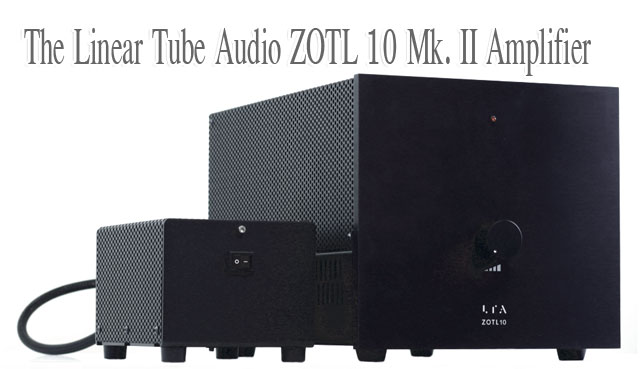
ZO-Tl It On the Mountain
 In the beginning, there was 1.0. I home demoed it; partly in the presence of both Will and…no, not Grace. Mark. Will and Mark; the twonicer n’ nice audio zealots that run Linear Tube Audio who were over my apartment to pick ‘er up after attending a New York Audio show.
In the beginning, there was 1.0. I home demoed it; partly in the presence of both Will and…no, not Grace. Mark. Will and Mark; the twonicer n’ nice audio zealots that run Linear Tube Audio who were over my apartment to pick ‘er up after attending a New York Audio show.
I felt bad. To be honest (for a change), I just didn’t fall in love with ZOTL 10 version 1.0. Maybe that was because version 1.0 lacked what the late Harvey “Gizmo” Rosenberg used to call a sufficiently “simple and stiff” external power supply? Or maybe because it had to follow the double-threat head amp/integrated Micro ZOTL (with said “very simple and very stiff” external supply) into battle in my system which, even when used as an integrated with like 1.5 watts or something, seemed to out-punch, out-prance and generally kick rainwater all over the façade of its comparatively lumbering stablemate.
Man! On my highly efficient Tekton Lore Reference speakers, if the Micro had five more watts I wouldn’t be writing this thing. I’d be in the Bornean rainforest with that magical little black box, retired! From writing about audio that is. I’d still hafta keep the day job (remotely) though. (Student loans, man. A boatload of themL.)
Yeah, both as a head amp and an integrated, the mighty mini Micro was something special; though my reference ALO Studio Six headphone amp (still on gracious long-term loan), possessing a touch more rounded beauty and depth, just pipped it to the post in this regard (even with the Micro ZOTL’s upgraded linear power supply), thereby retaining its reference status in the process and all the attendant glory conferred upon it by said status. (We heap laurels upon it nightly, say blessings/sing hymns).
In the interim, I discovered the wonderful Wells Audio Majestic integrated amp. This amp has become a reference/touchstone for me. Stately and quiet, with heaps of power and a beguiling bit of warmth and “majesty” in the sound, the Wells (which I finally succeeded in fitting in my stereo cabinet by removing the back of the cabinet!) is gonna be around for a while… Unless… unless the ZOTL 10 Mk. II can vote it off the island!? Manage to get a rose? Devise its own lip kit and make a billion dollars while the rest of us over-educated serfs cry ‘Fie l!! Foul !! What does she really DO!!? Tell me!! [In any case, insert your fave reality TV metaphor for winning here!] Then; read on!!
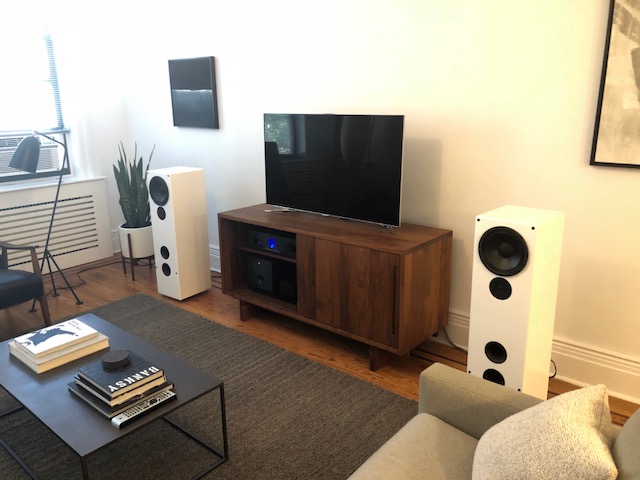
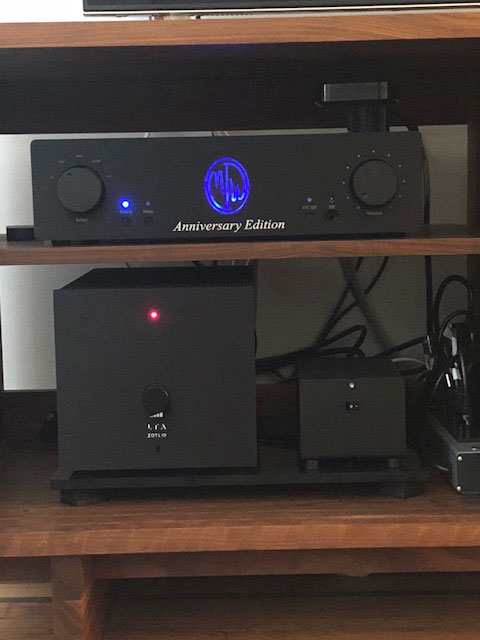
Section II on ZOTL Mk. II
This is NOT your mother’s amplifier, though David Berning certainly gave all known tube amplifier circuit topologies a good bit of How’s your Father when he got the patents on the ZOTL, or Zero-Hysteresis Output Transformer-less topology. Let me give you an in depth electrical description of how a ZOTL circuit works. Okay, there’s a resistor and you put it in series with a capacitor and then you have ‘e’ to the exponent 1 over x squared’ which you divide by “I have no idea.” I do know that what you come out with is something with no output transformer and that means the thing weighs like 5 pounds when it should theoretically take two men to lift it. And there you have it; science.
Okay. So that’s not exactly how it works. For the one person who is considerably more interested in the ZOTL’s precise architecture and design (and you know who you are):
http://davidberning.com/technology As always, you’re welcome that one guy!!
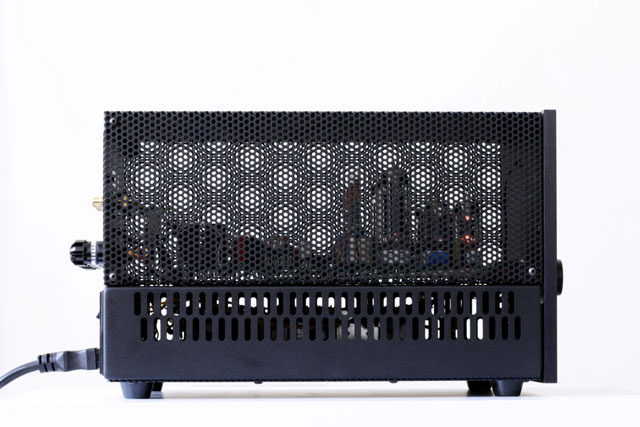
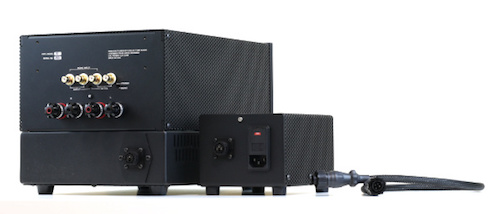
Now that the tough technical part is out of the way, how does a ZOTL 10 Mk. II look and feel and what can it do? Well it’s a rectangular black box measuring 9 inches wide by 8.5 inches tall by 18 inches deep which is capable of being used either as an integrated amplifier or as a regular old amplifier (but which is anything but regular; see above). I used it predominantly as the latter, though it acquits itself very well, thank you, as the former. Interiorly, just like version 1.0, it sports a tube complement which includes two 12 AT7’s, two 12AU7’s and four EL-84’s. More specifically, Will explained that my review amp, “… has the stock tubes, which consist of NOS 12AT7s (usually Sylvania or GE), NOS 5814/12AU7s (again, usually Sylvania or GE), and current production Genalex Gold Lion EL84s. The 12A7s need to be matched pairs, but the EL84s have an auto-bias circuit that eliminates the need for a matched quad.” Neat!
Ah, but in contradistinction to the Mk. I, this ZOTL Mk. II has an external linear power supply and it’s plenty “simple and strong!” So that’s new. “Gizmo” would be proud!
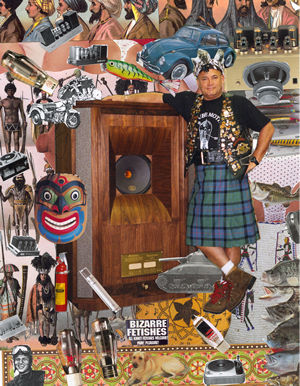
Says Will via email, “The original ZOTL10 did not have an external power supply. The ZOTL10 Mk.II actually only has an external transformer; the rest of the power supply is in the bottom section of the case, like the original power supply. We tried having the entire thing in a single case, but while listening to the amp with very sensitive headphones, which would be a sensitivity not likely matched by any speaker and was just done out of curiosity, the very quiet hum of the transformer was detected, though it had seemed to be totally quiet through speakers. Knowing this noise was present, even if not heard when using it with speakers, meant that we needed to get rid of it! Thus, the transformer was exiled to its box.”
Exile on Transformer street…
Whether it was down to this newly exiled (and probably grieving for his family) power transformer, or the differing electrical properties of the air molecules in my most recent apartment, ZOTL the Second is definitely NOT ZOTL the First. Aye! Here’s a lively kitten indeed! Where ZOTL the First did not press my ‘wow’ button however lightly in terms of dynamic drive or bass, ZOTL the Second is what I would call in technical terms, No. Friggin’. Joke. For whatever reason, the first track I played via Roon through my 12 volt LPS powered SOTM SMS-200 renderer and Aqua La Voce S2 DAC was “Clean” by The Japanese House. The Japanese House is neither a house nor Japanese. Rather, it seems to be a British songwriter named Amber Bain who maybe lived in a nice house in Japan for a time during undergrad at Reed College? Dunno.
But via ZOTL 2, Ms. Bain’s bass was (quite literally) room-shakingly deep; as deep as with the 15 times as powerful Wells Majestic integrated amplifier! This in fact, was the first time I’ve heard such bass depth and power since my review of the Atsah Hypex NCORE-based amps a year or two ago. As I ran through more and more tracks, it was immediately evident the ‘pseudo-stage (this is electronica after all), was rather expanded beyond my system’s norm in both width and depth.
Vocals on her latter EP “Swim Against the Tide” had a tantalizing sweetness without being cloying and the rhythmic outlines of each piece rolled along, buoyed by the wonderful deep synth bass, which at times; even at the lowish levels at which I listen, slightly shook my midcentury furnishings. For more such ridiculous/pillowy synth bass, see the tracks Good Side in and Leon from the self-same EP.
Okay! Enough of this frothery. et’s move on to some REAL music! With apologies to Ms. Bain. I knew Mozart. I worked and lived with Mozart. Mozart was a friend of mine and you, ma’am, are no Mozart. But I love your electronicaJ Peace! On my old favorite Mitsuko Uchida’s playing of my friend Mozart’s No. 5 piano concerto with Jefferey Tate conducting, the depth of sonic field the ZOTL revealed was striking, and notably on par with that portrayed by the wells Majestic integrated I’m so fond of. So too were the clarity and precision of instrumental outlines and in this regard, the ZOTL may somewhat exceed the Wells, which takes a little more water color approach with outlines and textures. Comparatively, throughout my Mozart meanderings the ZOTL gave me a slightly more lit up and forward presentation and this was quite refreshing. No doubt, the LTA guys would attribute this to (output) transformer eviction and (power) transformer exile.
The Wells for its part, (now in house and side by side with the LTA as I managed to take the back part of my media cabinet off in order to be able to fit it just barely into my media cabinet), retained a slight edge in terms of dynamic impact. Though to be sure, it’s 150 ballsy/beefy slightly tubey watts against 10 super squeegee clean ones. Even via acoustically (and emotionally) sensitive loudspeakers like my Tekton Lore References, what can one expect?
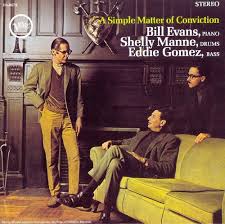 Bill Evans “A Simple Matter of Conviction” was a simple matter of joy. At lowish, “don’t-disturb-the-neighbor” levels, it was all sooooo satisfying; the sparkle and corporeality of the piano and the beautiful instrumental separation along with the stunning stage depth and bass. You can’t help but focus on the marvelous sound of the instruments themselves and then your ear goes to the blend of the trio; the subtlety of Shelly Manne’s delicate brush and cymbal work together with the dying overtones of Evans’ piano, the ZOTL presented it all for the hearing without ever calling attention to itself. If you want to revel further in the stage depth and staging the ZOTL allowed for, (and I for one did), another track I stumbled upon was Denison Witmer’s “Ringing of the Bell Tower” from his album Are you a Dreamer. This one’s just got stunning staging and spot-on tonality. “This ZOTL amp, in conjunction with my Modwright SWL Anniversary 9.0 preamp, may just be the soundstaging and tonality leader of all the amps I’ve ever had in my home,” I thought to myself before relaxing into the music again.
Bill Evans “A Simple Matter of Conviction” was a simple matter of joy. At lowish, “don’t-disturb-the-neighbor” levels, it was all sooooo satisfying; the sparkle and corporeality of the piano and the beautiful instrumental separation along with the stunning stage depth and bass. You can’t help but focus on the marvelous sound of the instruments themselves and then your ear goes to the blend of the trio; the subtlety of Shelly Manne’s delicate brush and cymbal work together with the dying overtones of Evans’ piano, the ZOTL presented it all for the hearing without ever calling attention to itself. If you want to revel further in the stage depth and staging the ZOTL allowed for, (and I for one did), another track I stumbled upon was Denison Witmer’s “Ringing of the Bell Tower” from his album Are you a Dreamer. This one’s just got stunning staging and spot-on tonality. “This ZOTL amp, in conjunction with my Modwright SWL Anniversary 9.0 preamp, may just be the soundstaging and tonality leader of all the amps I’ve ever had in my home,” I thought to myself before relaxing into the music again.
Collision Course; Wells vs. ZOTL II
It had to happen. Mano y Mano. Berning v. Wells (sounds like a supreme court case!); my fave integrated amp vs. the burgeoning object of my amplifier affections/affectations paired with my Modwright SWL 9.0 Anniversary pre. Let it be said that the Haydn battle was an attempt to simplify and tease out sonic differences for the purposes of literary comparison, though it’s conclusions are generally how I heard things overall.
Sooooo let’s get ready toooooo…. Play some Haydn?! (Now there’s a battle cry you don’t hear often) To be more specific, a recording of Haydn from 2000 with Mikhail Pletnev playing Haydn concertos. It’s a well recorded and delightfully musical album and it’s the kind of thing I “jam” to when gone awry off my steady diet of Cardi B and Demi Lovato.
Here I noted that the ZOTL/Modwright pairing had a touch more stage width and depth than the Wells; itself no slouch in those departments though not quite at the level of the very best stagers I’ve heard (Stello S100 mk. 2, Atsah Hypex monoblocks etc.). The Wells counters with a bit more of a “muscular”/dense presentation and this indeed is the Wells’ thing, namely PWaD; Power Weight and Density. This difference may also be attributable to the removal of the bit of midbass thickening output transformer-based designs (particularly tubed ones) have in comparison to the one of the few examples of an amp without any such hardware. Mind you, by no means is the ZOTL sound “thin” in any relative sense, just cleaner and a bit more crystalline than the Wells, which often puts me in mind of an excellent though none-too-syrupy tube amp. To wit, you could hear this relative tonal difference in both the lower end of Pletnev’s piano’s range and in the bowing of massed cellos. Both amps had a sparkling and tonally beautiful top end and had that certain way with string texture and tone that makes you go “yeah- I could live with this a whileJ.”
I would say both amps acquitted themselves very well dynamically and via my 96db Tekton Lore reference speakers I never ever said to myself, “nice, but the ZOTL is only 10 watts.” Rather, there was no significant delta in musical impact or dynamics I might attribute to power differences. “Pretty remarkable,” I thought. The caveat(s) is of course that I don’t listen at high levels to pounding Terminator 6 Blu-rays in my 30’ x 40’ foot acoustically isolated home theater room. N.B: not making fun of or committing micro-aggressions against those who enjoy Terminator 6 Blu-rays or those of you who have dedicated home theater rooms. Please invite me over for wine.
Berning Man
Bottom line; ZOTL is the TOTL deal. It’s lightweight, compact, doesn’t run warm enough to pull a Berning man on your furniture and over months of constant use has proven itself as bulletproof reliable and quiet as any solid-state amp in my long experience. No hisses, hums or weird tube rushes etc. You turn it on, it warms up quick and it plays music beautifully. You turn it off and there’s a quiet thump letting you know “message received” and that’s it; no drama.
Until, that is, you wake it from its slumber and play a favorite recording. Then, if the track warrants it, there’s drama aplenty. There’s a sweeping soundstage, lightning transients and yes, rumbling, powerful bass; all from a 10-watt amp! Just don’t use your old Apogee Scintillas or something less than say 86 or 87db efficient or, if you do, maybe have really small room and a penchant for solo lute music.
With (relatively) efficient speakers, for the music I listen to, if there’s a more all-around stone cold musical amplifier for under five or six thousand bucks that is also capable of wowing you with the stuff of audiophile sonic fantasy, I haven’t heard it. An exotic amp without the exotic price tag or any of the exotic finicky-ness or tweaky-ness that term usually implies. Very very highly recommended.
A Cold Footnote: You MUST CHILL !!!
PS: Observe, as I deftly present a (subjective) case that this is the greatest low-level amp ever. Exhibit A: Vancouver Sleep Clinic’s album Therapy 01 streamed via Roon/Tidal. I defy you to listen to this album via the ZOTL during breakfast on a lazy Sunday morning and even if you’re super neurotic and lost your last Xanax, NOT chill most righteously and most firmly. Even sober, you will ride a sonic rollercoaster deep into the soundspace and watch asteroids and comets ricochet off each other while being shaken to your very core self by the deep synth bass of the tracks like “Utopia” and many others. (Wait; does this sound like a TV call in ad? There should be one! Folks, BE dialin’!)
Seriously, dude; You MUST CHILL! And you must do so at low volume levels to this exact album. No other amplifier in my experience chills you so thoroughly and righteously whilst still letting you soak in all that rumbling bass, awash in a cosmic soundscape and mystery like the ZOTL 10 Mk. II. Your honor, I think I’ve made my point most spaciously. The defense rests. Err…. chills.

I’d like to thank the Academy, David Berning for writing a great circuit diagram and Will and Grace… I mean Will and Mark, without whose guidance and patience, such a long deep listen would not have been possible. As always…
I bid you peace.


David Abramson
SPECIFICATIONS:
• Sensitivity: 1.2V RMS for 10 watts output
• Output impedance 1.2 ohms
• Input impedance: 50k
• 100V / 120V / 240V operation: Auto-switching
• Hum and noise: 94dB below full output (measured at 20Hz-20kHz) • Carrier: -50dB (460kHz)
• Power output with 4-ohm load: 12W, 0.5% THD
• Power output with 8-ohm load: 10W, 0.5% THD
• Frequency response (8-ohm load): 6Hz to 60kHz, +0, -.5dB
• Amplifier class: Push-pull Class AB
• Voltage gain (8-ohm load): 18dB
• Size: 9 inches (23 cm) wide, 8 1/2 inches (22 cm) tall, 18 inches (46 cm) deep (including connectors), 7.25″ L x 4.75″ W x 4.12″ H
• AC umbilical: 24″
• Net weight: Amplifier: 14 lbs./6.4 kg, Transformer case: 5.1 lbs/2.3 kg
• Finish: Aluminum case
• Tube complement: two 12AT7s, two 12AU7s, and four EL-84s
Retail price: $3,200.00
ADDRESS:
Linear Tube Audio
7316 Carroll Avenue
Takoma Park, MD, 20912
Tel: 301-448-1534
http://www.lineartubeaudio.com
Stereo Times Masthead
Publisher/Founder
Clement Perry
Editor
Dave Thomas
Senior Editors
Frank Alles, Mike Girardi, Russell Lichter, Terry London, Moreno Mitchell, Paul Szabady, Bill Wells, Mike Wright, and Stephen Yan,
Current Contributors
David Abramson, Tim Barrall, Dave Allison, Ron Cook, Lewis Dardick, John Hoffman, Dan Secula, Don Shaulis, Greg Simmons, Eric Teh, Greg Voth, Richard Willie, Ed Van Winkle, Rob Dockery, Richard Doran, and Daveed Turek
Site Management Clement Perry
Ad Designer: Martin Perry



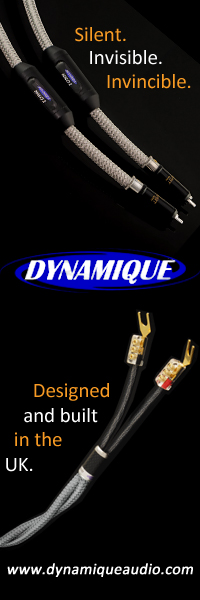
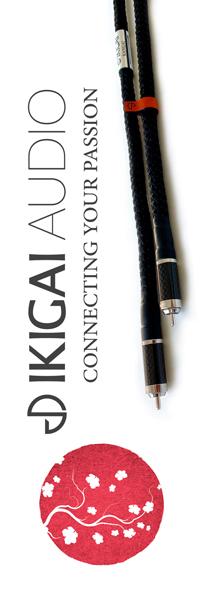
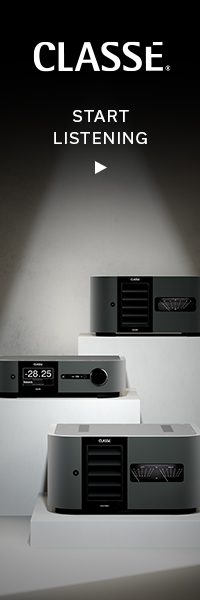
Be the first to comment on: Linear Tube Audio ZOTL 10 Mk. II Amplifier